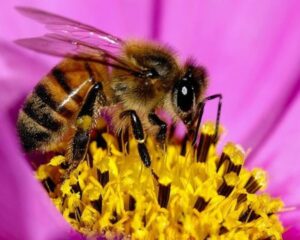‘Bee-Friendly’ Plants Tainted with Bee-Killing Pesticides

A recent study found that big box home improvement stores including Lowe’s and Home Depot sell “bee-friendly” home garden plants that are pre-treated with pesticides suspected of killing bees and causing the mysterious condition known as colony collapse disorder. The Pesticide Research Institute’s pilot study found seven of 13 samples of garden plants from major retailers contained neurotoxic pesticides known as neonicotinoids that studies show could harm or kill bees and other pollinators.
“The pilot study confirms that many of the plants sold in nurseries and garden stores across the U.S. have been pre-treated with systemic neonicotinoid insecticides, making them potentially toxic to pollinators,” Timothy Brown, Ph.D., of the Pesticide Research Institute, said in a statement. “Unfortunately, these pesticides don’t break down quickly — they remain in the plants and the soil and can continue to affect pollinators for months to years after the treatment.”
The plants pre-treated with potentially bee-killing pesticides come with no warning to consumers. Plants treated with neonicotinoids continue to exude the pesticides in pollen and nectar for months to years after initial treatment, according to the Pesticide Research Institute study.
Environmental organizations Friends of the Earth, Sum of Us and allies sent letters — along with petitions signed by more than 175,000 people — to Lowe’s, Home Depot, Target and other garden retailers asking the stores to stop selling neonicotinoids and plants pre-treated with the pesticides. Most of the UK’s largest garden retailers have already stopped selling neonicotinoids. The U.S. campaign to stop the practice can be found at: www.BeeAction.org.
Global bee die-offs are believed to be due to a combination of factors, including pesticide exposure, habitat loss, bee management practices, poor nutrition and lack of genetic diversity, according to the Environmental Protection Agency (EPA). But neonicotinoids used in agriculture and on garden plants are specifically implicated as a key suspect in recent global bee die-offs. From 2006 to 2012, U.S. beekeepers reported to USDA surveys losing an average of more than a third of their hives, according to the Boston Globe. Some beekeepers reported losses of up to 90 percent of their bees. The European Union has suspended use of three neonicotinoids this year after a scientific review by European Food Safety Authority found neonicotinoids pose an unacceptably high risk to bees. In the United States, the EPA has developed new pesticide labels that advise against use of neonicotinoid pesticide products where bees are present. The advisory labels will be placed on the pesticides themselves, not on retail garden plants treated with the pesticides.
“Multiple factors play a role in bee colony declines, including pesticides. The Environmental Protection Agency is taking action to protect bees from pesticide exposure and these label changes will further our efforts,” Jim Jones, assistant administrator for the Office of Chemical Safety and Pollution Prevention, said in a statement.
The EPA, however, has delayed action on banning use of neonicotinoids until 2018. A bill currently in Congress called the Save America’s Pollinators Act (HR 2692) would suspend the use of pesticides that threaten bees until a full review of scientific evidence indicates they are safe and a field study demonstrates they do no harm to bees and other pollinators. It was referred to the Congressional Subcommittee on Horticulture, Research, Biotechnology, and Foreign Agriculture August 13. You can ask your congressional representatives to support the bill through a Friends of the Earth portal.
Keep in touch with Kristi on Twitter @VeggieConverter and Pinterest
Image: Danny Perez Photography via Compfightcc

